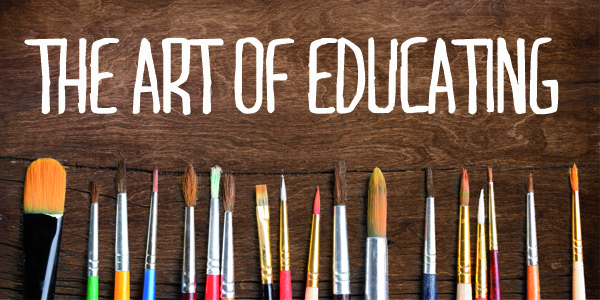The Art of Educating

The government believes Science, Technology, Engineering and Mathematics (STEM) subjects are the secret to the UK’s success but are we missing a huge opportunity by overlooking the arts? Christine Toner reports.
A year ago Prime Minister Theresa May announced her industrial strategy. The plan, she said, was to boost the effectiveness of UK industries and improve our economy. Her strategy focused on ten key points including more investment in science and research, a greater emphasis on developing skills, improvements to both digital and physical infrastructure and more help for business to grow.
And the key to all of this? A focus on science, technology, engineering and maths as well as numeracy and digital skills. What was quite glaringly missing from this strategy was, of course, any sort of spotlight on the arts. STEM subjects were billed as the ones that would lead the way in the British business world. The arts and creative skills that can play a huge part in the economy didn’t get a look in.
It was an omission that didn’t go unnoticed. Indeed, the Creative Industries Federation (CIF) was quick to respond. Speaking to creative bible Design Week a spokesperson said: “Developing skills – and encouraging the right mix of skills – is critical. We understand the government’s focus on STEM but highlight that creative skills are needed not just by the creative industries but in everything from car manufacturing to engineering.”
The CIF went on to say that a greater focus should be placed on creative subjects in education, to help enable young people to take on jobs in areas with skill shortages, such as visual effects and animation.
Of course the government’s push on STEM subjects is nothing new.
Creative subjects were controversially excluded from the English Baccalaureate (Ebacc) – a performance measure for schools in England. Furthermore in a survey by the National Union of Teachers (NUT) 60% of secondary school staff have seen cuts to subjects not included in EBacc.
A poll of 1,200 teachers carried out by the NUT along with the Association of Teachers and Lecturers claims that the EBacc is putting subjects and staff under threat. The study revealed 61% of respondents reported cuts to teaching posts in non-EBacc subjects, such as drama and music, compared with 38% reporting cuts in teaching posts for ‘core’ academic subjects like maths and science.
And industry bodies hit out at the government for failing to properly fund the arts in the UK.
The CIF published a report with BOP Consulting which found that the UK government’s spending on the arts is lower than other nations, despite people’s engagement with culture being high.
The C. Report grouped information under three headings – the creative industries, public art and creative education. It compares the UK with six nations – France, Germany, Italy, Brazil, Korea and the USA.
The research shows that the UK’s creative industries have the highest export rates and the second highest economic value. Engagement with culture is also higher in the UK than any of the countries surveyed with 52% of the adult population having visited a museum or art gallery in the last year.
Despite this, says the report, the UK falls behind France, Germany, Korea and Italy when it comes to government spending in arts. Furthermore only 9% of the school curriculum for 14-16 year olds is dedicated to arts subjects.
Speaking of the report Sir John Sorrell, founder of the CIF, said: “The UK has led the way in developing its world-class creative sector but we can’t be complacent. In order to stay at the top, we need to invest in the future – especially in creativity in schools, where the number of pupils taking design and technology has halved in the last decade. That is cutting off the skills pipeline we need for future success.”
Yet for all the push of STEM subjects it seems the government has not achieved its desired outcome. According to the Organisation for Economic Co-operation and Development (OECD) there hasn’t been much improvement in terms of the country’s performance in these subject areas. The OECD’s Programme for International Assessment found there has been little change in maths and science performance among 15 and 16 year olds.
So should we now be looking closer at the merits of arts? According to the Cultural Learning Alliance (CLA) we should.
The CLA conducts research into the impact of arts in schools and the importance of creativity.
Its key research findings published last year included:
1. Participation in structured arts activities can increase cognitive abilities by 17%.
2. Learning through arts and culture can improve attainment in maths and english.
3. Learning through arts and culture develops skills and behaviour that lead children to do better in school.
4. Students from low-income families who take part in arts activities at school are three times more likely to get a degree.
5. Young offenders who take part in arts activities are 18% less likely to re-offend.
6. Children who take part in arts activities in the home during their early years are ahead in reading and maths at age nine.
7. People who take part in the arts are 38% more likely to report good health.
John Robinson is managing director of David M Robinson (DMR), UK fine jewellery and watch retailer, a business which thrives on creativity and design. He says there is definitely a link between opportunity and creativity. “If we give children the chance to learn from great teachers, with access to the best materials, they will progress academically too” he says. “If you look at LS Lowry, whilst he was famous for his ‘matchstick men and cats and dogs’, he was classically trained. You have to be good before you can be different.” Aside from academic success, creative subjects can have a huge impact on a child’s wellbeing.
Alice Demba, Liverpool’s cultural education coordinator who is working with the Liverpool Learning Partnership to set up a Liverpool Cultural Education Partnership, highlights the CLA’s findings: “Theatre and drama improve young people’s social skills and emotional wellbeing,” she says. “We also know that engaging in the arts increases young people’s resilience – a key component of good mental health.”
Alice says music and art can have an empowering affect on young people.
“As the report from the CLA shows specific art forms can have specific benefits,” she says. Singing can help with language learning (Ludke et al, 2014). Music increases IQ and dance and drama social skills (Schellenberg, 2004). Hong Kong research shows particular improvements in creativity and communication through studying visual arts (Hui, He and Sam Ye, 2015). German research has shown a causal relationship between music and educational attainment (Yang, 2015).”
John agrees.
“As a creative business, we understand the importance of the arts and their influence on empowering individuals,” he says. “Founded in a Liverpool workshop almost 50 years ago, our roots lie firmly in the creativity of our goldsmiths and in the designs that evolve here.”
And while the government’s strategy to boost the UK’s economic performance may be centred largely on STEM subjects both Alice and John believe creative subjects can significantly benefit the economy going forward.
“Employability of students who study arts subjects is higher and they are more likely to stay in employment”, says Alice. ‚”Students from low-income families who engage in the arts at school are twice as likely to volunteer, students from low-income families who engage in the arts at school are 20% more likely to vote as young adults”
John says to businesses such as David M Robinson, whilst academic progress is valuable, it is the skill and personality of the individual that captures both the management and the clients.
“With evidence proving that creativity is an important method of expression, it assists in the development of strong, confident characters, who prove to be fantastic asset to businesses like DMR.”




